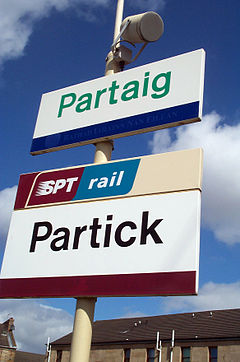Partick, Lanarkshire
Partick
| |
|---|---|

| |
|
Partick shown within Glasgow
| |
| Area | 0.85 km2 (0.33 sq mi) |
| Population | 8,884 (2015) |
| • Density | 10,452/km2 (27,070/sq mi) |
| OS grid reference | NS554665 |
| Council area | |
| Lieutenancy area |
|
| Country | Scotland |
| Sovereign state | United Kingdom |
| Post town | GLASGOW |
| Postcode district | G11 |
| Dialling code | 0141 |
| Police | Scottish |
| Fire | Scottish |
| Ambulance | Scottish |
| EU Parliament | Scotland |
| UK Parliament | |
| Scottish Parliament | |
Partick (Scots: Pairtick, Scottish Gaelic: Pàrtaig) is an area of Glasgow on the north bank of the River Clyde, just across from Govan. To the west lies Whiteinch and to the east, Finneston, and to the North Hillhead and other areas which make up the West End of Glasgow. Partick was a Police burgh from 1852 until 1912 when it was incorporated into the city. Partick is the area of the city most connected with the Highlands, and several Gaelic agencies, such as the Gaelic Books Council (Scottish Gaelic: Comhairle nan Leabhraichean) are based in the area. Some ATMs in the area display Gaelic.
The modern name derives from the ancient Cumbric Peartoc (as in the modern Welsh word perth, meaning "bush or thicket").
This was adopted into Scottish Gaelic as Peart(h)aig, giving modern Gaelic Pearraig or Pàrtaig (the latter is used on signs at Partick railway station). Older anglicised forms include Perdyc and Perthick. Partick, of old Perdyec, from the Gaelic aper dhu ec, meaning the place at the confluence or mouth of the dark river.
Although Partick remained a village until the middle of the 18th century, it is an ancient place. The Kings of Strathclyde had a residence there, and in 1136 David I (1124–53) granted the lands of Perdyc to the see of Glasgow. The Bishops of Glasgow had a country seat in Partick. It was later the site of Partick Castle, a country home of George Hutcheson (demolished 1836).
...
Wikipedia

